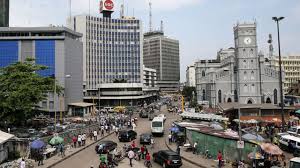OPS Calls For Guided Relaxation Of Lockdown To Save Economy
Organised Private Sector, OPS; Nigeria Labour Congress, NLC, and its United Labour Congress of Nigeria, ULC, counterpart, have agreed that there is need for guided relaxation of the COVID-19 lockdown.
They said guided relaxation was the only way to save the economy from imminent collapse.
OPS said while businesses remain passive and unproductive with attendant mass losses of revenue, overhead costs remained.
This is just as Nigeria Labour Congress, NLC, and its United Labour Congress of Nigeria, ULC, counterpart, insist that the earlier the nation does a strategic relaxing of the lockdown the better for the country and its citizens.
OPS, speaking through Nigeria Employers’ Consultative Association, NECA, in a statement contended that while the government should take decisive steps to protect lives, efforts should also be made to keep productive activities going to avoid looming job losses.
In a statement by its Director-General, Dr Timothy Olawale, NECA said: “The truth is that five weeks of economic and business shutdown has overstretched the limits and businesses are beginning to buckle under the weight of the burden it is carrying without a corresponding productivity from workers and necessary support from government. “This is the reality today. Balancing the protection of lives with economic interests should ordinarily not be difficult. While protection of life should take precedence, the need to protect the economic foundation of the nation cannot be discounted as the economy will ultimately sustains life.
“While the government takes decisive steps to protect lives, efforts should also be made to keep productive activities going.
“Without delicately balancing the scale, the consequential negative effects of the pandemic will not only include unimaginable loss of lives, massive job losses and heightened insecurity, it might also lead to unnecessary social revolt.
“While a lot has been said on the intervention of the Federal Government and various coordinated efforts of other stakeholders, more decisive action on stimulus to businesses need to be taken.
The announced stimulus, to a large extent has not addressed the critical needs of businesses that will guarantee sustainability and protection of jobs.
“Much more can still be done now, not belatedly, to save jobs in Nigeria. More direct intervention such as direct wage or income support, wage subsidies, tax credits or tax deferrals, short-term work schemes, moratoriums on loan payments and the establishment of a coronavirus Job Retention Scheme, where government pays up to 60% of private sector salaries until June, as long as workers are not laid off, as done in other climes i.e. UK, France, and Denmark, etc would reduce the negative impact on businesses and slow the rate of job loss. While it is desirable for the lockdown to be relaxed and not totally removed, it is important to state that a mismanagement of the lockdown relaxation process might spell doom for the gains already achieved.
“It is worthy of note that the main objective of the lockdown was to contain and curtail the spread of the virus. While the recent upsurge in number of confirmed cases might be attributed to increased spread of the virus and also increased testing capacity of the Nation, the need to manage the socio-economic impact of current lockdown cannot be over-emphasised.
“With a large population of the country in the informal sector and many surviving on daily wages, the continued total lockdown has the tendency to further cripple businesses, hasten the rate of job loss, and increase the level of poverty with consequential effect of increased insecurity.
“A relaxed lockdown with legislated State and National Guidelines to prevent the spread of the virus will go a long way in maintaining the gains of the past few weeks.
The guidelines should include compulsory use of sanitisers, free protective gears by government (face mask, hand gloves (where necessary), maintenance of social distancing, increased education and awareness (posters, etc), total banning of religious, political and social gatherings, limited number of passengers in public and private transportation and strict enforcement of same, amongst others.





